Like mother, like son, Mayor Tony Yarber never seems to stop moving. Photo by Imani Khayyam.
Tony Yarber
As Mayor and Pastor Tony Yarber prepared to deliver a Christmas Eve message via Periscope from his mom's kitchen this year, the sound of Mama Yarber's cake mixer could be heard just off camera. Like mother, like son, Mayor Yarber never seems to stop moving. This is evidenced by the fact that it's not uncommon for the mayor to sport sneakers with his suits or by his regular excursions out of town for conferences and to drum up support for Jackson on Capitol Hill. In his first full year as Jackson's chief executive officer, Yarber has endured and addressed rumors that he is a target of possible corruption probe (he has denied this), navigated a fiscal deficit that led to employee furloughs (he and the city council worked out a deal to stave off property-tax hikes), infrastructure emergencies and good bit of political scrutiny for all of it. However, Yarber would argue that his administration closed 2015 on some high notes, including his promises to start work on projects from the 1-percent sales-tax fund, the Jackson Police Department's reports of a reduction in crime from last year and the announcement of several new initiatives to encourage property ownership in Jackson. — R.L. Nave
Adrienne Domnick
If artists such as Adrienne Domnick have anything to say about it, pop art won't be remembered as an art style from the 1960s. She brings a modern element to it with her high-contrast paintings of figures in pop culture, such as Jean-Michel Basquiat and musician Ray Charles. Besides painting, she also works at Pearl River Glass as a glass artist and does photography.
This year, her art was featured in many events around town, such as the Mississippi Museum of Art's Museum After Hours in August, and she also has pieces up at Offbeat in midtown. But besides her art, the Jackson native is also working to make her neighborhood, midtown, a little better. She opened her studio in midtown in 2012. She is currently the president of the neighborhood's business association, Made in Midtown. Artists like her are helping to create a strong community in midtown and by extension, Jackson. —Amber Helsel
Chris Epps
Somehow, Chris Epps managed to work his way up through the rank and file of the Mississippi Department of Corrections to have a Democratic governor appoint him as commissioner and last through three terms of Republican governors. Then, somehow, he managed to screw it all up by getting involved with a scandal that ended in his pleading guilty to federal corruption charges in February 2015.
The charging documents allege that Epps convinced prospective vendors to hire a Rankin County political player named Cecil McCrory as a consultant. When the vendors won the bids, McCrory would kickback some of the cash to Epps. Neither Epps nor McCrory, who together were charged for 49 crimes, have been sentenced. However, the corruption scandal prompted Gov. Phil Bryant to convene a special task force to examine procurement at MDOC, and several other changes at the state prison system have also followed. — R.L. Nave
Dr. Carey Wright
Anyone who attended the Legislative Budget Committee hearings knows that state Superintendent Carey Wright can weather a storm—and weather it well. Drilled with several questions about the department's $2.8 billion budget request, the state superintendent was able to stand her ground and defend the department's requested budget increase. Since her appointment in 2014, Wright has initiated and continued to improve several programs, including the third-grade reading gate and pre-K collaboratives, updated state testing standards, and continued to ask the Legislature for necessary and increased funding to help support the majority of the state's children who attend public schools.
Wright, so far, has remained optimistic yet realistic about the speed of progress in the state. This year, she acknowledged low test scores on the consortia exams that students took for the first time, with the understanding that students will continue to be exposed to such high standards when they take the first round of state-developed assessments in 2016. The assessments are supposed to be in line with rigorous standards she has already exposed students to, and she expects scores and student progress to improve over time. — Arielle Dreher
Rexdale Henry
The death of Rexdale Henry came at a time when Mississippi and the rest of the nation was on high alert for citizens dying in law-enforcement custody. In fact, Henry was arrested and taken to the Neshoba County Jail the day after a white police officer killed a black man named Jonathan Sanders a couple of counties away. Henry's case was unique because he was not only a member the Choctaw tribe, but he had also been a political candidate for a seat on the Choctaw Tribal Council from the Bogue Chitto community. Henry was arrested on July 14 for outstanding fines, which totaled more than $2,600 over the years.
"His fines shouldn't have led to his death. It couldn't have been that bad," John Steele, a Henry family spokesman, told the Jackson Free Press at the time. In a bizarre twist, 16 days after Henry's death, authorities charged his cellmate, 34-year-old Justin Schlegel, with his murder. — R.L. Nave
Corinthian Washington
People love a good controversy, and this year, show promoter Corinthian Washington provided two for the Jackson music scene in a small window of time.
First, there was the Fondren's First Thursday fiasco in September, which revolved around unauthorized rappers taking the stage and delivering vulgar lyrics at a hip-hop showcase that Washington organized. As a result, FFT founder Ron Chane said he would no longer allow hip-hop at the monthly event.
Then, in November, Washington announced that his inaugural 3rd Eye Music Festival had to find a new venue, despite the City originally approving the use of Fondren Park. Theories differed as to the reason behind the City's reversal, but Washington said in an interview with JFP that he felt it was because the event featured hip-hop and would bring a predominately young, black audience.
Both times, Washington and the other parties resolved their issues. Chane said he quickly realized that leaving out local hip-hop artists "would be a disservice to the community," and Washington, the City and the Jackson Police Department came to an agreement and placed 3rd Eye back in Fondren Park. Ultimately, these resulted in positive changes, but here's hoping for Washington having a smoother route to them in 2016. — Micah Smith
Joce Pritchett
Jocelyn Pepper Pritchett had one hell of a year. In late June, the U.S. Supreme Court struck down same-sex marriage bans as unconstitutional, which meant that Pritchett's marriage to her wife, Carla Webb, would be legally recognized in the state of Mississippi. This came on the heels of a 2014 lawsuit where Pritchett and Webb challenged the legality of Mississippi's anti-gay marriage amendment, which made it to a federal appeals court, which held off on making a ruling because the court knew SCOTUS would make a decision in 2015.
There was little time to celebrate because Pritchett also qualified to seek the Democratic nomination for state auditor, the first openly gay person to run for statewide office in Mississippi. She ran a sophisticated campaign for state auditor with a strong social-media presence and regularly took her opponent, incumbent Stacey Pickering, to task on key issues. Even though Pritchett didn't win her election, she'll certainly go down in the history books as a Mississippi trailblazer. — R.L. Nave
Robert Gray
Remember when Ross Perot's running mate, Admiral James Stockton, opened a 1992 vice presidential debate by positing, "Who am I? Why am I here?" Gubernatorial candidate Robert Gray's political debut was strikingly similar.
Gray, who grew up in Jackson and Terry, led a quiet life as a long-haul truck driver before submitting his name as a Democratic candidate for governor, even if hauling a truck full of sweet potatoes and other errands eventually kept him voting for himself. Gray shocked the political world, the Democratic establishment, and even his own mom by besting two women who went through the trouble of assembling campaign staffs and going on the stump to be the Democratic standard bearer against incumbent Gov. Phil Bryant. After he won the nomination, Gray got serious and brought on his kid sister, Angela, to manage the campaign and started showing up to events to drum up support for his candidacy.
In the end, the power of incumbency in a Republican stronghold like Mississippi was too much for Gray to overcome. At the very least, though, he'll have quite a story to share with buddies at truck stops for the rest of his life. — R.L. Nave
Carlton Reeves
Perhaps it should come as no surprise that U.S. District Judge Carlton Reeves—only the second African American federal judge in Mississippi history, whom President Barack Obama appointed early in his first term—would end up being one of the most progressive judges on the federal bench. In late 2014, Reeves struck down Mississippi's same-sex marriage as unconstitutional. Early this year, the statement he read to three of the white men charged with killing James Craig Anderson before he sentenced them was chilling and beautiful that National Public Radio published it in its entirety. Late this year, Reeves ruled that Mississippi must continue operating under a consent decree for one of its privately run prisons.
"The protection of prisoner rights greatly impacts prisoners, the prison staff in charge of overseeing the prison facility and even those who may visit the facility. And we cannot overlook the impact the treatment of prisoners has on the rest of society," Reeves wrote in the order.
Make no mistake: Reeves isn't some a tree-hugging, soft-on-crime liberal jurist. At the aforementioned hearing on prison conditions, which took place on Good Friday, after a recess he threatened to throw anyone in jail whose cell phone rang in his courtroom. Pretty sure he was only half-serious. — R.L. Nave
Victor Mason
In a classic case of being in the right place at the right time, Victor Mason was able to benefit from a Hinds County jail that seemed to be in the news every other day to push out the incumbent Tyrone Lewis. For his part, Mason started his law enforcement career with the Jackson Police Department, and worked for the Mississippi Bureau of Narcotics, JPD's vice and narcotics, intelligence and youth divisions. He took a leave of absence from his job as an investigator for the Mississippi Attorney General's office to run for sheriff.
During his campaign, he seized on problems at the Raymond Detention Center that was not only fodder for the nightly news but also became the basis for a U.S. Department of Justice report that is likely to result in a legal settlement. Mason said he wanted to tackle youth crime by bringing back role models, telling the JFP: "Bring back guys that were in the military, that are willing to volunteer on our team. Bring back normal everyday people that can teach these people the Bible, that can teach these young people the way of life." — R.L. Nave
Cecil Brown
When Mississippi Republicans predictably redid the voting boundaries after the 2010 Census and moved to eliminate white Democratic seats, Jackson Rep. Cecil Brown's fate was uncertain.
Brown, an education-policy wonk and former chairman of the House Education Committee, would have had an uphill climb in running against a Republican incumbent in Rep. Bill Denny.
But instead of fading into the background, Brown found a new cause—the Mississippi Public Service Commission. Brown had already retired from a 40-year career as a certified public accountant and money manager, which he believes will help in analyzing financial deals facing the PSC, which regulates utility companies. Brown's victory in November also gives Democrats majority control over the PSC—he joins Northern District Commissioner Brandon Presley—making it one of the only Mississippi state agencies not controlled by the GOP. — R.L. Nave
Patti Igoe-Bett
Many pre-made pancake mixes tend to be unhealthy, with lots of preservatives, sugars, salts and other additives. Patti Igoe-Bett has made it her mission to fight back on that. Her business, MsPattiCakes, which makes healthy pancake mixes began as a way to give her grandson, who has celiac disease, pancakes that didn't have all the additives. She began the business officially in May 2014 and now makes her products in Mississippi Cold Drip Coffee & Tea's incubator kitchen at The Hatch in midtown. This year, business such as the Livingston Mercantile Store and Mississippi Gift Company have picked up her products. — Amber Helsel
Bilal Qizilbash
The third weekend of December, Bilal Qizilbash had three important things to do: see "Star Wars: The Force Awakens," complete his master's degree in biomedical sciences from Mississippi College and, as he had done every weekend for nine months, take food to homeless people in Smith Park.
Qizilbash (pronounced kizzle-BOSH) founded a group called R U Hungry? to provide hot meals to homeless people on Friday nights because he saw a need that social-service organizations are unable to fill.
"For as many people who claim to love Jesus and love religion, I've seen some of the most unreligious behavior in regard to treating the homeless—almost like they're a blight on society—(as opposed to) saying 'How do we help these people a little?' Instead of getting angry at the symptom, why don't we go to the root cause of the problem?" Qizilbash, who is Muslim, told the JFP in December.
He said he wants to formally organize R U Hungry? into a nonprofit so that the group can apply for grants; currently, he and fellow volunteers spend $150 to $200 out of pocket on the weekly feasts. Qizilbash is also an inventor and is working on a process to mass produce juiced curly kale, which he discovered can kill cancer cells. In 2016, he will begin a master's in business administration program at Mississippi College. — R.L. Nave
Sharon Brown
The year 2015 was a revival year for the state flag debate. Community organizer and Jackson native Sharon Brown was one of the first Mississippians to take action against Ballot Initiative 54 that proposes to make the current state flag permanent. In response, Brown filed Ballot Initiative 55 on Oct. 9 to remove the Confederate battle flag and any emblems of the Confederacy from the state flag permanently.
Brown also helped organize the 1 Flag for All rally in October, drawing support from civil rights activists and politicians in a march to the Capitol, including activists from in and out of state like Myrlie Evers-Williams, David Banner and South Carolina Rep. Jenny Horne (who fought to bring down the Confederate battle flag outside her state's Capitol). Brown's initiative must receive 107,000 signatures before the end of 2016 for it to go on a ballot for voters.
Brown attributes her fight and determination to her mother's challenge to stand up and do something—despite hardships. She wants to see a state flag that unites Mississippians with peace, unity and love. — Arielle Dreher
In Memoriam
Drake Elder, former owner of Bebop Records; Tom Freeland, attorney and blogger; Howard Jones, jazz multi-instrumentalist; B.B. King, blues musician; James "Hot Dog" Lewis, blues musician; Claude McInnis, Democratic Party leader; Patrice Moncell, soul-blues singer; Anne Moody, civil-rights activist and author; Stephanie Parker-Weaver, health and civil-rights activist; Jonathan Sanders, horse trainer whose death sparked civil-rights protests; Dee Smith-Smathers, LGBT civil-rights pioneer

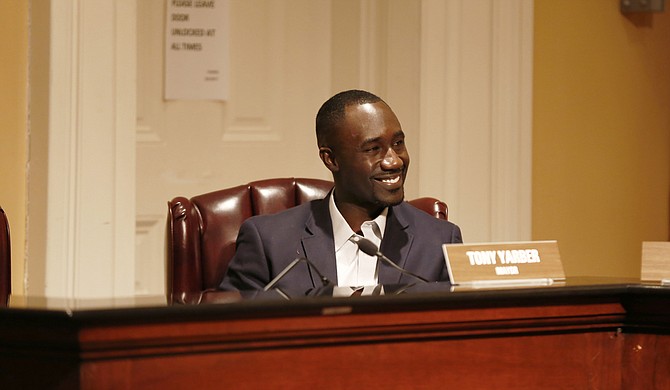







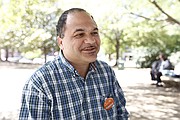
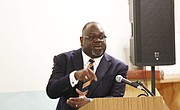
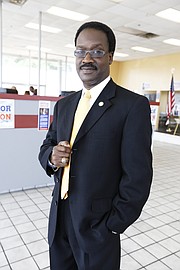
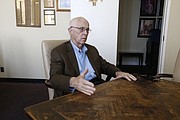
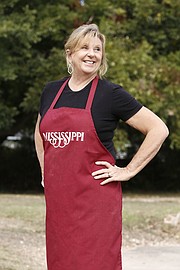



Comments
Use the comment form below to begin a discussion about this content.
comments powered by Disqus